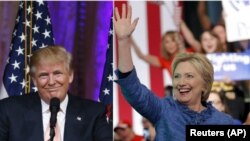New U.S. political surveys show the likely presidential contenders, Republican Donald Trump and Democrat Hillary Clinton, are locked in tight contests in three battleground states that could control the outcome of the November election.
Clinton, a former U.S. secretary of state, continues to hold about a 6-percentage-point national lead over Trump, a brash billionaire real estate mogul. But Tuesday's Quinnipiac University polls in the eastern state of Pennsylvania, neighboring Ohio and the southeastern state of Florida show voters closely divided in all three, where U.S. presidential elections are often decided.
The surveys show Clinton, seeking to become the first female U.S. president, with a 43 to 42 percent edge in both Pennsylvania and Florida. Trump, a one-time reality television show host who has never held elective office, is ahead in Ohio, 43 to 39 percent.
The outcomes in the three states could be crucial, particularly if either Clinton or Trump swept them all. U.S. presidential elections are not decided by the national popular vote, but rather in state-by-state contests, where the number of each state's electoral votes is determined by how many members of Congress it has based on the state’s population.
‘Too close to call’
Peter Brown, a Quinnipiac polling official, said that six months from the November 8 election the contests in the three states "are too close to call."
Trump surged to the top of the crowded Republican presidential field on the strength of his outspoken calls for deportation of 11 million immigrants living illegally in the United States, construction of a wall along the U.S.-Mexican border to halt the stream of more migrants into the U.S. and a temporary ban on Muslims entering the country.
He has won more than 10.7 million votes from Republicans in months of state party nominating contests. But key party leaders, including the last two Republican presidents – George H.W. Bush and his son, George W. Bush – have declined to endorse his candidacy. The party's current top elected official, House of Representatives Speaker Paul Ryan, has reserved judgment pending a get-together with Trump on Thursday.
Party favorites
Despite the reservation among some Republican leaders to embrace Trump, another poll Tuesday, by the Gallup survey organization, said that Republican voters, by a 64-to-31 percent margin, hold a favorable view of him.
Similarly, Gallup said that Democratic voters have a 70-to-26 percent favorable view of Clinton, who has yet to clinch her party's presidential nomination but holds a commanding lead over her sole challenger, Vermont Senator Bernie Sanders.
Fear factor
In the overall electorate, Americans hold negative views about both candidates. An NBC News/Survey Monkey poll showed 47 percent of those surveyed said their reaction to Trump becoming the Republican nominee was fear, with just 26 percent saying they were hopeful.
The NBC survey said 35 percent were scared of Clinton winning the Democratic nomination, with 29 percent hopeful.
Trump all but clinched the Republican nomination a week ago with a decisive victory over his remaining challengers in the Midwestern state of Indiana. Clinton and Sanders are squaring off in another party primary Tuesday in the mountainous eastern state of West Virginia.
Sanders acknowledges that he only has "a narrow path" to the Democratic nomination over Clinton, but has vowed to stay in the race through the end of the state nominating contests in early June.
The winner of the November election will succeed President Barack Obama when he leaves office next January after eight years in the White House.




